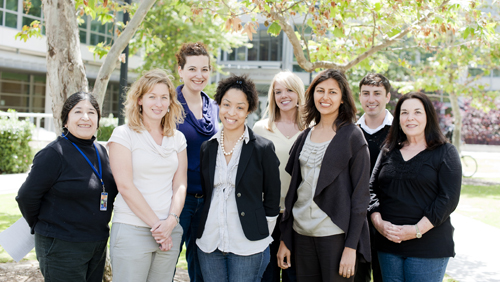Trials Use Technology to Help Young Adults Achieve Healthy Weights
November 29, 2010 -- Sometime in the first half of 2011, nearly 400 overweight or obese university students will be recruited by researchers at the University of California, San Diego to test if technology can help the young adults lose weight.
|
Funding for all the trials aimed at engaging young adults in protecting their future heart health is from the National Heart, Lung, and Blood Institute (NHLBI), one of the National Institutes of Health (NIH).
"These studies have the potential to teach us about successfully engaging young adults in achieving a healthy weight at a critical time in their lives," said Susan B. Shurin, M.D., acting director of the NHLBI. "Learning effective strategies for weight management further empowers young adults to protect their future heart health. These studies are designed to provide evidence to help us guide young adults toward approaches that work and allow them to choose the options that work best for them."
The Early Adult Reduction of Weight through Lifestyle Intervention (EARLY) Trials seek to prevent weight gain and promote weight loss among young adults, defined as ages 18-35, through healthy eating and physical activity. The trials are receiving a total of $36 million over five years and are partially supported by the Eunice Kennedy Shriver National Institute of Child Health and Human Development.
|
Previous NHLBI research has shown that people aged 18-49 gain an average of 1-2 pounds each year, with the largest weight gain of 3 pounds per year occurring in 20-29-year-olds. Such weight gain can lead to high blood pressure, high blood cholesterol, diabetes, and other risk factors for cardiovascular disease. Few studies have examined how to effectively engage this high-risk age group in achieving and maintaining a healthy weight.
The following individual trials will help reach young adults aged 18-35:
- Treating Adults at Risk for Weight Gain with Interactive Technology (TARGIT) at the University of Tennessee Health Science Center, Memphis, will use the iPod Touch, webinars, and podcasts to deliver a behavioral weight loss intervention to young adults who are trying to quit smoking. Delivered in conjunction with an effective tobacco quit line, TARGIT will be the first combined tobacco cessation-weight management program targeted to young adults. There will be 330 participants. ClinicalTrials.gov ID: NCT01199185. Participant contact: (901) 448-8400 or www.targitstudy.org
- Innovative Approaches for Diet, Exercise, and Activity (IDEA) at the University of Pittsburgh will test how a weight loss intervention enhanced with text message reminders and wearable exercise monitors improves weight loss as compared to a standard intervention. There will be 480 young adult participants. ClinicalTrials.gov ID: NCT01131871. Participant contact: (412) 488-4184 or www.idea.pitt.edu
- eMoms Roc: Electronically Mediated Weight Interventions for Pregnant and Postpartum Women at Cornell University/University of Rochester, N.Y., will test Internet-based programs to promote the health of pregnant and postpartum women. These e-interventions will focus on diet, physical activity, weight, and other issues of interest to childbearing women. The 3,500 participants will be ethnically and socioeconomically diverse women in their first 20 weeks of pregnancy. eMoms Roc is co-funded by the Eunice Kennedy Shriver National Institute of Child Health and Human Development. Participant contact: http://www.emomsroc.org/
- Choosing Healthy Options in College Environments and Settings (CHOICES) at the University of Minnesota, Minneapolis, will test a for-credit course that includes Web-based social networking to prevent unhealthy weight gain in 440 student participants attending two-year community colleges. ClinicalTrials.gov ID: NCT01134783. Participant contact: (612) 624-2374 or Megan Treziok (trezi003@umn.edu)
- Cell Phone Intervention for You (CITY) at Duke University, Durham, N.C., will test two weight loss approaches against a control in a total of 360 participants. In one approach, participants will use cell phones for self-monitoring and social networking. In the other, they use cell phones for self-monitoring only and also receive personal coaching. ClinicalTrials.gov ID: NCT01092364. Participant contact: (919) 681-CITY (2489) or www.dukecitystudy.org
- Social/Mobile Approaches to Reducing Weight (SMART) at UC San Diego aims to recruit 380 overweight or obese university student participants for its trial. ClinicalTrials.gov ID: NCT01200459. Participant contact: smartstudy@ucsd.edu
- Study of Novel Approaches for Prevention (SNAP) at Brown University/Miriam Hospital will test a Web-based weight management intervention against a control in 600 young adult participants. The goal is to help participants self-regulate their weight by either making large changes in their eating and exercise habits to lose weight, or making small changes to prevent or reverse weight gain. ClinicalTrials.gov ID: NCT01183689. Participant contact: www.snapstudy.org
The trial teams have completed initial research on the best ways to recruit young adults and keep them active in the proposed trials. Some have now begun to recruit participants for the two-year, randomized, controlled clinical trials. All seven trials are expected to start enrollment by spring 2011.
Although each trial is slightly different and will be conducted at a single institution, the teams are using a set of common measures and questionnaires so they can better compare their findings when the trials are complete.
"Comparing findings and pooling data from all seven studies will maximize what the research community learns about developing strategies to address weight control among young adults," said Catherine Loria, Ph.D., a nutritional epidemiologist in the NHLBI's Division of Cardiovascular Sciences.
People interested in participating in one of the trials are encouraged to contact each site directly.
More information can be found at www.clinicaltrials.gov.
To schedule an interview with an NHLBI spokesperson, contact the NHLBI Communications Office at 301-496-4236 or nhlbi_news@nhlbi.nih.gov.
Related Links
National Heart, Lung, and Blood Institute
Center for Wireless and Population Health Systems
SMART Trial
Media Contacts
NHLBI Communications Office, 301-496-4236, nhlbi_news@nhlbi.nih.gov or Doug Ramsey, 858-822-5825, dramsey@ucsd.edu


